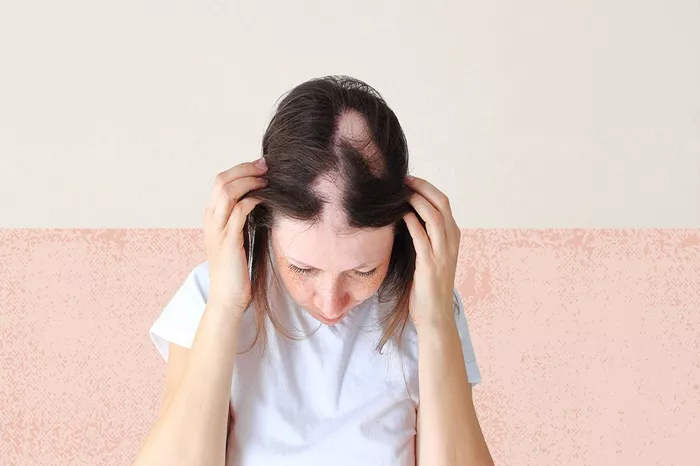Hair loss, also known as alopecia, can be distressing and affect self-esteem. Many diseases can cause hair loss. Some affect the hair follicles directly. Others cause hair loss as a symptom. Understanding these diseases helps in managing and treating hair loss effectively.
Autoimmune Diseases
Alopecia Areata
Alopecia areata is an autoimmune disorder. The immune system attacks hair follicles. This causes patchy hair loss. The hair can fall out in small round patches. Sometimes, it can lead to complete scalp hair loss (alopecia totalis) or entire body hair loss (alopecia universalis). The exact cause is unknown. Genetics and environmental factors may play a role.
SEE ALSO: Does Hair Transplant Work for Alopecia Areata?
Lupus
Lupus is another autoimmune disease. It causes the immune system to attack healthy tissues. This includes skin, joints, and organs. Lupus can cause hair loss. This can be due to inflammation of the skin and scalp. It can also be a side effect of medications used to treat lupus. Hair loss in lupus patients can be diffuse or patchy.
Hashimoto’s Thyroiditis
Hashimoto’s thyroiditis is an autoimmune disorder. It affects the thyroid gland. This leads to hypothyroidism. Hypothyroidism slows down metabolism. It affects hair growth and health. Hair may become dry, brittle, and thin. Hair loss can be diffuse.
Hormonal Imbalances
Polycystic Ovary Syndrome (PCOS)
PCOS is a hormonal disorder. It affects women of reproductive age. It causes enlarged ovaries with cysts. Symptoms include irregular menstrual cycles, acne, and weight gain. PCOS leads to an excess of androgens (male hormones). This can cause hair thinning on the scalp and increased hair growth on the face and body (hirsutism).
Hyperthyroidism
Hyperthyroidism is an overactive thyroid gland. It produces too much thyroid hormone. This speeds up metabolism. It can cause weight loss, rapid heartbeat, and sweating. It also affects hair growth. Hair may become thin and brittle. Diffuse hair loss is common.
Scalp Infections
Tinea Capitis
Tinea capitis is a fungal infection of the scalp. It is also known as scalp ringworm. It causes round, scaly patches of hair loss. The patches may be red and inflamed. This infection is more common in children. It spreads through direct contact with an infected person or animal. It can also spread through contaminated objects.
Folliculitis
Folliculitis is an infection of hair follicles. It is caused by bacteria, fungi, or viruses. It leads to inflammation and pus-filled bumps. These bumps can break open and crust over. Severe folliculitis can cause scarring and permanent hair loss.
Genetic Disorders
Androgenetic Alopecia
Androgenetic alopecia is a common genetic condition. It is also known as male-pattern baldness or female-pattern baldness. In men, it causes a receding hairline and balding on the top of the head. In women, it causes hair thinning on the top and crown of the head. It is caused by a combination of genetics and hormones.
Nutritional Deficiencies
Iron Deficiency Anemia
Iron deficiency anemia is a lack of iron in the body. Iron is essential for producing hemoglobin. Hemoglobin carries oxygen to the body’s tissues, including hair follicles. A lack of iron can cause hair to become dry, brittle, and thin. Diffuse hair loss is common.
Vitamin D Deficiency
Vitamin D is essential for healthy hair follicles. It helps create new hair follicles. A deficiency can lead to hair thinning and hair loss. It can also make the hair more prone to shedding.
Chronic Illnesses
Diabetes
Diabetes affects the body’s ability to produce or use insulin. Insulin is essential for regulating blood sugar levels. High blood sugar levels can damage blood vessels. This affects blood flow to the hair follicles. It can lead to hair thinning and hair loss.
Kidney Disease
Kidney disease affects the kidneys’ ability to filter waste from the blood. This can lead to a buildup of toxins in the body. These toxins can affect hair health. Hair may become thin and brittle. Hair loss can be diffuse.
Stress-Related Conditions
Telogen Effluvium
Telogen effluvium is a condition where hair enters the resting phase (telogen) prematurely. This can be triggered by stress, illness, or hormonal changes. Hair sheds excessively. It is usually temporary. Hair growth typically resumes after the trigger is resolved.
Dermatological Conditions
Psoriasis
Psoriasis is a chronic skin condition. It causes red, scaly patches on the skin. When it affects the scalp, it can cause hair loss. The scales can cause itching and inflammation. Scratching can lead to hair breakage and loss.
Seborrheic Dermatitis
Seborrheic dermatitis is a common skin condition. It causes red, greasy, and scaly patches. It affects the scalp, face, and other oily areas of the body. On the scalp, it can cause dandruff and hair loss. The exact cause is unknown. It may be related to yeast on the skin and an overactive immune response.
Treatment Options
Medical Treatments
Treating the underlying disease is crucial. This may involve medications, lifestyle changes, or surgical interventions. For autoimmune diseases, immunosuppressive drugs may be used. Hormonal imbalances may be treated with hormone therapy. Scalp infections require antifungal or antibacterial medications.
Topical Treatments
Topical treatments can help manage hair loss. Minoxidil is a common over-the-counter treatment. It helps stimulate hair growth. Corticosteroid creams can reduce inflammation. Antifungal shampoos can treat scalp infections.
Nutritional Supplements
Nutritional supplements can support hair health. Iron supplements can help with iron deficiency anemia. Vitamin D supplements can address vitamin D deficiency. A balanced diet rich in vitamins and minerals supports overall hair health.
Lifestyle Changes
Lifestyle changes can improve hair health. Managing stress is crucial. This can involve exercise, meditation, or therapy. A healthy diet supports hair growth. Avoiding harsh hair treatments and styling can prevent further damage.
Conclusion
Understanding the diseases that cause hair loss is essential. It helps in managing and treating hair loss effectively. If you experience hair loss, consult a healthcare professional. They can diagnose the underlying cause and recommend appropriate treatments. With proper care and treatment, hair health can be restored.


